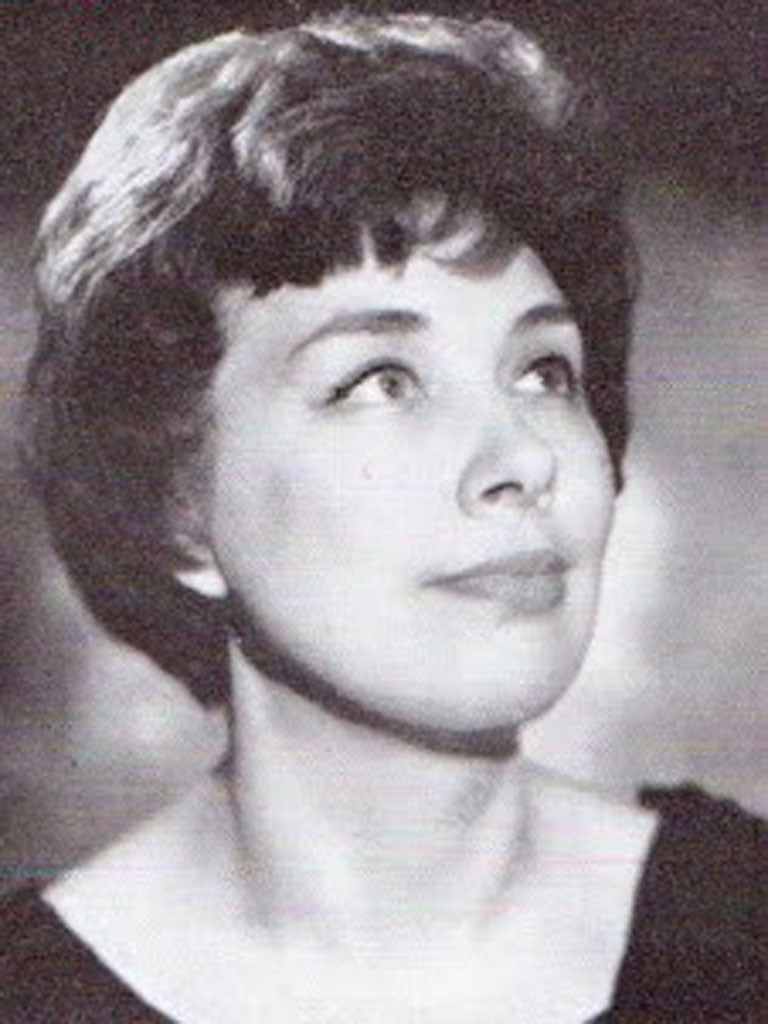
Your support helps us to tell the story
From reproductive rights to climate change to Big Tech, The Independent is on the ground when the story is developing. Whether it's investigating the financials of Elon Musk's pro-Trump PAC or producing our latest documentary, 'The A Word', which shines a light on the American women fighting for reproductive rights, we know how important it is to parse out the facts from the messaging.
At such a critical moment in US history, we need reporters on the ground. Your donation allows us to keep sending journalists to speak to both sides of the story.
The Independent is trusted by Americans across the entire political spectrum. And unlike many other quality news outlets, we choose not to lock Americans out of our reporting and analysis with paywalls. We believe quality journalism should be available to everyone, paid for by those who can afford it.
Your support makes all the difference.The contralto singer Jean Allister was as much at home on the concert platform as on the operatic stage, and in modern music as much as the classics. She sang at the Proms (1959-70, the Three Choirs Festivals 1961-77), and at Glyndebourne (1962-68). Versatile and adaptable, in 1963 she sang Gilbert and Sullivan at the Royal Albert Hall; a medieval music drama, as Mary Magdalene in Visitatio Sepulchri, in the then new Coventry Cathedral; and Verdi's Requiem, in memory of President Kennedy, conducted by Dorati in the Royal Festival Hall.
She was born in Ballymoney, Co Antrim, and studied singing in London under Norman Allin at the Royal Academy of Music. Her Mistress Quickly in the Academy's 1954 production of Verdi's Falstaff was "a very positive theatrical achievement" and later in the same year she was in Elijah at the Royal Festival Hall, where her warm tone was particularly noted. In Handel's Belshazzar at the Foundling Hospital in July 1955 she "stood out [from the other soloists] for the firm vibrant quality of her alto voice".
In the same month, as Suor Angelica at the Academy, "strikingly beautiful notes at the top and plenty of power in reserve" were noted. This was a double bill with Gianni Schicchi, with Rinuccio sung by the tenor Edgar Fleet; they were married in 1955 and undertook joint engagements such as Britten's Spring Symphony at the Academy in 1956 and the same composer's Abraham and Isaac at the Royal Court, after which one critic remarked: "both are admirably suited to duetting".
At the Three Choirs Festival in Worcester (1960), she sang in the first British performance of In Terra Pax – the Swiss composer Frank Martin's 1945 "oratorio-brève" – with its extended aria for alto. In 1975 she was one of the soloists in the British premiere of Martin's Requiem, also at the Three Choirs Worcester. Never long away from opera, in 1961 she was Isabella in The Italian Girl in Algiers conducted by Peter Gellhorn – "a sumptuous voice and a saucy stage presence". Fleet was again in the cast, as Lindoro. Her attractiveness was not always to her advantage: as the old battleaxe Katisha in The Mikado at Sadler's Wells (1962), she was "far too personable".
At Glyndebourne the same year she sang in Ariadne auf Naxos, preceded by the Old Vic's Le Bourgeois Gentilhomme. Also in 1962 she was Arnalta the nurse in L'incoronazione de Poppea, displaying "a voice of striking beauty and flexibility." In 1968 she was Melide in Cavalli's L'Ormindo conducted by Raymond Leppard.
She enjoyed singing in ensembles, whether Buxtehude at St Clement Danes, or unaccompanied 16th-century composers or Brahms's Liebeslieder at the Victoria and Albert Museum. Early in her career, as a member of the Ambrosian Singers, the alto line consisted of herself, Pamela Bowden, Heather Harper (before she became a soprano) and Helen Watts! She was one of the 16 distinguished soloists in Vaughan Williams's Serenade to Music at Sir Charles Groves' farewell concert with the Bournemouth Symphony Orchestra in May 1961.
It was under Groves that she sang in Mahler's Symphony of a Thousand at the Proms in 1964, and the following year the Resurrection Symphony with Dorati at the Royal Festival Hall. In 1968 she tickled the fancy of William Mann, who declared that her performance in Alexander Nevsky was "[one] of the memorable characteristics of this thrilling interpretation."
Other notable performances include Henze's Novae de Infinito Laudes, in Leeds (1964)and London (1965), Rossini's Petite Messe Solennelle at the 1968 Caerphilly Festival – where the final Agnus Dei was delivered "with a rare beauty of tone by Jean Allister, to whose timbre it seemed exactly committed" (Kenneth Loveland in The Times) – and as Herodias's page in Strauss's Salome in 1971, her overdue Covent Garden debut – for William Mann "sounding fine and acting with a heavy urgency that interestingly suggested a strong young man rather than the willowy boys that junior mezzos usually suggest." She was also Clotilda in Delius's Koanga and the Red Nanny in the premiere of John Gardner's The Visitors at Aldeburgh (both 1972).
Her final appearances on stage were as Grandma ("still vigorous") in English National Opera North's Jenufa, produced in 1980 by David Pountney in Leeds, where she continued to teach, privately and at the City College of Music, and to live with her second husband, René Atkinson.
Garry Humphreys
Jean Maria Allister, contralto and teacher: born Ballymoney, Co Antrim 26 February 1932; married 1955 Edgar Fleet (one son), 1974 René Atkinson; died Church Crookham, Hampshire 11 July 2012.
Join our commenting forum
Join thought-provoking conversations, follow other Independent readers and see their replies
Comments